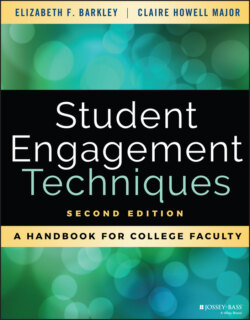Читать книгу Student Engagement Techniques - Elizabeth F. Barkley - Страница 39
Humanism
ОглавлениеHumanists believe that learning is a personal act in which individuals seek knowledge and understanding in order to fulfill their own potential as well as expand their awareness of the human condition. They suggest that learning occurs through watching the behavior of others or studying significant works of the human intellect and imagination and then considering the results of those actions as they also cultivate an appreciation of human values and achievement. Humanists believe the purpose of learning is to enable learners to participate in social and cultural communities, understand and empathize with others, and appreciate the variety of perspectives and responses to the human condition.
From the humanist perspective, effective teachers design opportunities for learners to increase their self-awareness and to practice thinking critically, especially the ability to make reasoned judgments that reflect ethical and esthetic human values. Humanist theories of learning tend to be value-driven, and several instructional approaches have been developed that reflect those values, including approaches such as critical pedagogy (Freire), service learning, and authentic learning activities. Humanists tend to believe that:
Learning is a personal act to fulfill development.
The teacher's job is to employ strategies that facilitate the development of the whole person and to serve as a model of appropriate behavior.
Learners are responsible for their own learning and should learn to self-regulate.
Teachers should strive to encourage learner autonomy and learners should be given a choice in the tasks they undertake.
The teacher can tell when learning has happened through a learner's demonstrated self-actualization and autonomy.
